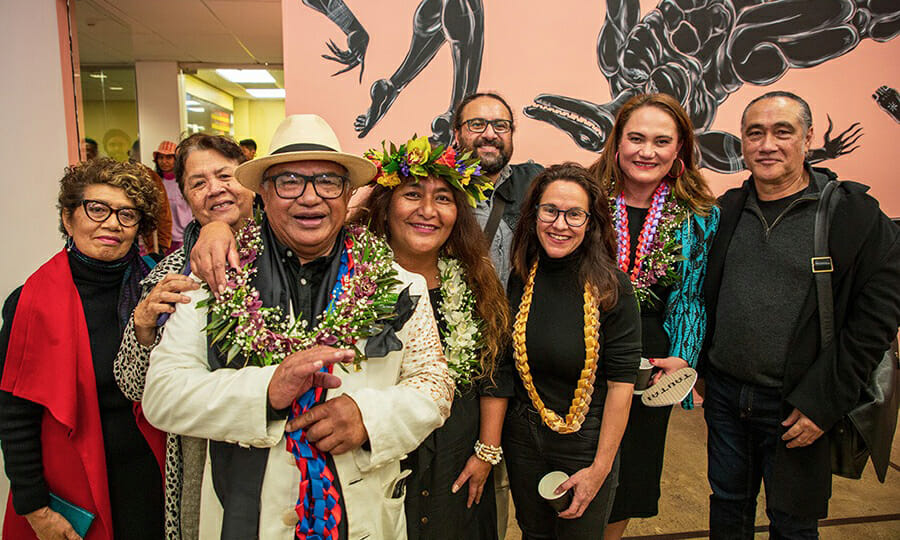
Can you tell us a bit about your career background?
I undertook a BA in Art History and Law from The University of Otago and an MA in Art History from The University of Auckland, specialising in cross-cultural representation, Māori and Pacific arts. I later completed an internship at The Smithsonian Institution in Washington DC, working on one of the world’s largest festivals, The Smithsonian Folklife Festival, celebrating cultures around the globe.
Previous Auckland based posts include Public Programmes & Cultural Relations Manager, Auckland Museum; Visual Arts & Public Programmes Manager, Auckland Arts Festival; and Manager of Alberton House, Heritage New Zealand. While in Britain I was most recently Director of Urban Soul Orchestra. Prior to that I was employed as Visual Arts Officer, Arts Council England and Patrons Programme Manager, Venice Biennale for Creative New Zealand.
How have you found returning home to New Zealand after your time abroad?
It has been a very strange time coming home, mainly as it has coincided with a global pandemic. I started my role at the beginning of March and found myself in the first lockdown soon afterwards. One of the areas I focused on in my MA thesis was the geographical distance between the U.K. and N.Z. and the subsequent cultural implications, especially in terms of national identity. This duality is part of my DNA, having a Kiwi Mother and British Father and spending parts of my life living in both countries. With the effect that Covid-19 has had on travel, that tyranny of distance has been exacerbated.
I am sure other Kea members can empathise with that impulse of having been being drawn towards the company of New Zealanders to experience a sense of home while living overseas. Now I am back it is interesting to find common ground with some of the more than 50 000 of us who have found ourselves on N.Z. shores again.
What is the purpose of the British Council?
The British Council is the United Kingdom’s international organisation for cultural relations and educational opportunities. It was founded in 1934, and our first overseas offices opened in 1938, making us the oldest cultural relations organisation in the world. Originally, we were called the British Committee for Relations with Other Countries.
The early 1930s were a time of global instability and Britain’s influence was weakened because of a global financial depression, which reduced living standards, jobs, and trade. At the same time, extreme ideologies were gaining ground, with the rise of Communism in Russia, and Fascism in Germany, Italy and Spain. In response to this, the UK government created the British Council.
Why do you think it is so important to facilitate cross-country relationships to highlight art, culture and education?
Generally I think it is vital to connect across countries and to build inter-cultural understanding. When times are difficult this is even more so and especially when geographical isolation comes into play so succinctly. We can also work together for the greater good in areas that are vital to us such as equality, diversity, and inclusion. I sincerely hope that we can find spaces where the UK can work together with Māori and Pacific organisations, artists and scholars as well as connecting with other diverse communities in Aotearoa.
How has Covid-19 affected your operations?
Aside from the financial implications for our partner organisations and ourselves, many projects have had to be cancelled. At the time of this interview we were undergoing a second lockdown, which is both challenging in terms of planning and also the psychology of trying to operate under the shadow of uncertainty on an ongoing basis. This was something I am aware my grandparents experienced during wartime but not something many of my generation have experienced so it will require the development of a new operational framework.
What’s next for the British Council, and arts and culture exchanges between NZ/Pacific and the UK?
Personally this year will be about reconnecting with former contacts and meeting new ones, discussing what is important to them and finding synergies as well as possibilities for collaboration and partnership. We are also trying to look for areas of opportunity in the new context, such as the digital arena. We are at an extremely pivotal time in our history when we have time to pause and potentially reset, which could well be crucial for our planet going forward. As such climate change is another area of common interest for both the UK and NZ and we are exploring potential arts and cultural projects to this end.
COMING HOME?
Resources
We’re here to support returning Kiwi. Here’s our list of resources to help you plan your return and next steps.
Jobs
Looking for a new role in New Zealand? Visit the Kea job portal and find your next career opportunity.

 MENU
MENU






